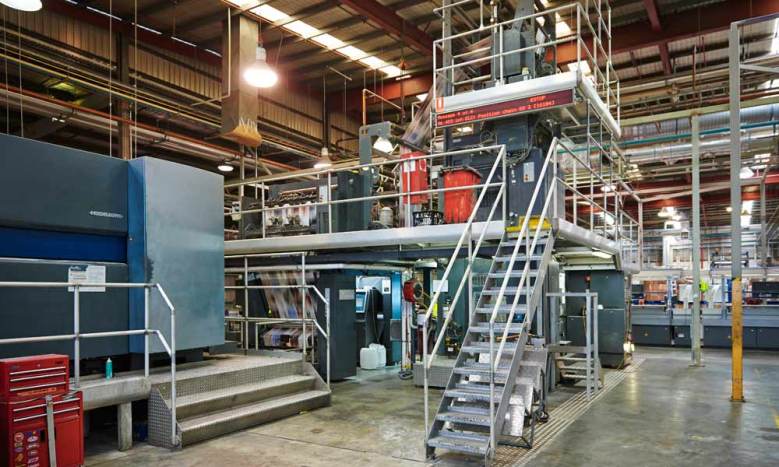
PMP saw its shares drop by almost 17 per cent overnight, becoming 20c this morning following the release of its full year results, down from 24c yesterday afternoon.
Sales for FY18 came to $734m, increasing by 21.9 per cent from $601.9m in the prior corresponding period (pcp). Although keeping with the IPMG merger last year with costs including the closure of three sites, sale revenue dropped by 12 per cent on a like for like combined business basis, going to $842m from $734m.
The $108m drop in revenue on a like for like basis comprised of $86m in local segment Print Australia and $22m in PMP New Zealand and Marketing Services. The print reduction was mainly due to the loss of major customers Coles and Pacific Magazines at $61m following the IPMG merger, with a further $25m being lost to volume cutbacks in newspaper and magazines sales.
Kevin Slaven, CEO, PMP, says, “This was the largest and most complicated integration in our industry’s history. The initial productivity and workflow issues are now behind us.
“After the merger and the physical integration of the businesses, we have now moved into a new era. We are a profitable business and we have the ability to grow new revenue streams.”
EBITDA for the group was $40.6m, up 26 per cent from $32.2m, which PMP says reflected its additional eight months profits from the IPMG business and post merger savings. The company’s earnings fell in line with its guidance which had been downgraded twice in the year.
The company saw a net loss after significant items of $43.8m, down from its loss of $126.4m the year before. Net profit before significant items came to $1.1m, with the company recovering from its loss before significant items of $1.9m in the year prior.
PMP is also investing in a new 80 page manroland press, to be installed at its Warwick Farm site in Sydney, costing it $20m. The company is buying the machine with the aim to retire older presses at both its facilities in Warwick Farm and Moorebank, Sydney, making a net reduction in its overall fleet capacity of around 10-15 per cent.
The company says the press will provide production efficiencies through wider web width, increased running speed and faster make-readies, and in addition will grant cost efficiencies through reductions in labour, energy, repairs and maintenance.
Slaven says, “The enhancement of data insights in our print and distribution will open up new opportunities for us. Additionally, the installation of a new press next year and retiring some of the older presses will strengthen our earnings.
“Revenue across our top 20 customers has grown year on year, and retail customers has also increased year on year.”
Local division Print Australia saw its revenue come to $440m, a 42.4 per cent increase from $309.5m in FY17, while the sector’s EBITDA rose by 43.6 per cent to $24.3m from $16.9m. Its heatset sales went up by $134.8m to $410.9m, delivering positive revenue for for the segment despite lower newspaper and magazine volumes and sales being $3.7m lower at subsidiary Griffin Press.
Catalogue sales were said to be performing well for Print Australia, with the company noting it provides additional distribution or digital marketing services to half its top 30 customers. CEO Kevin Slaven notes PMP’s top 20 clients represent 25 per cent of its total group revenue.
Distribution Australia’s sales came to $85.8m, slipping by 1.2 per cent from $86.8m in the pcp, while its EBITDA dropped by 3.2 per cent to $2.9m from $3m in FY17. Catalogue volumes increased by 1.3 per cent from the pcp, which PMP says reflected its increased market share. PMP says unfavorable price and mix in a competitive pricing environment was cited for the drop in performance.
Meanwhile PMP’s Marketing Services sector, which includes its digital services and print distributor Gordon & Gotch Australia, produced $87.5m up 14 per cent from $76.7m in FY17. EBITDA came to $6.3m, up 75.4 per cent from $3.6m in FY17. PMP saw higher digital marketing services revenue, which grew by $10.8m while Gordon & Gotch experienced a drop in its sales, down $3m or five per cent from the pcp. Gordon & Gotch’s volumes decreased by 10.5 per cent, with lower volumes and fewer titles from a number of its customers.
In its outlook, PMP says heatset pricing is stabilising in Australia. It also expects to see savings form its merger, although PMP says that will be offset by lower print volumes mainly in newspapers and magazines.
Slaven adds, “We have been hit with paper price rises, but the retailers and customers are aware of those increases and we have been able to work through them. The other thing to note is that suppliers are expecting those prices to stabilise.
“We are always proactive with telling our customers. The discussions are always around how can we improve the reach and reading time on their catalogue, and what data investments can we give them, to keep the catalogue in front of people.
“We are not a business in terminal decline. We do have a profitable and sustainable future.”
Comment below to have your say on this story.
If you have a news story or tip-off, get in touch at editorial@sprinter.com.au.
Sign up to the Sprinter newsletter
